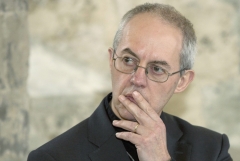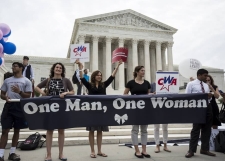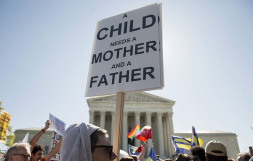Almost all Evangelicals are against the US Supreme Court ruling that legalised same-sex marriage throughout the US while 7 of 10 practicing Christians also oppose it.
A Barna Group survey conducted after the ruling was issued on June 26 showed that Americans are divided on the issue of same-sex marriage.
Almost half, or 49 percent, of the 1,012 US adults ages 18 and older that were surveyed said they support the decision while 43 percent said they're against it. About 40 percent said same-sex marriage will not have a positive impact on society while 37 percent said it will.
More than half (52 percent) said legalising same-sex marriage is morally right while 43 percent said it is wrong, and 52 percent said it is protected by the Constitution while 38 said it is unconstitutional.
About 94 percent of Evangelicals, as defined by Barna, said they are not in favour of the Supreme Court ruling, more than practicing Christians (66 percent) and general population (43 percent). Only 2 percent of Evangelicals said they support the ruling.
Barna defines Evangelicals as people who meet nine belief conditions including "saying they have made 'a personal commitment to Jesus Christ that is still important in their life today,' that their faith is very important in their life today; believing that when they die they will go to Heaven because they have confessed their sins and accepted Jesus Christ as their Saviour; and believing they have a personal responsibility to share their religious beliefs about Christ with non-Christians."
Practicing Christians, Barna said, "are self-identified Christians who say their faith is very important to their lives and who have attended a worship service, other than for a special occasion, one or more times during the past month."
The survey revealed that age played a role on how people viewed the Supreme Court decision.
Among all adults below 40 years old, 61 percent said they favour the decision while 42 percent of those above 40 support it.
For practicing Christians, 35 percent below 40 years old agree with the ruling while 26 percent of above 40 are in favour.
A total of 73 percent of non-practicing Christians below 40 favour the decision while 57 percent of above 40 agree to it.
"The only real agreement comes in the shared belief that Christians can support legal marriage for same-sex couples while also affirming the church's traditional definition of marriage being between one man and one woman (55 percent of practicing Christians under 40 vs. 58 percent of non-practicing Christians under 40)," Barna Group said.
David Kinnaman, president of Barna Group, said the survey showed "many practicing Christians—including Evangelicals—appear to be looking for ways to express their faith authentically in this cultural context."
The survey showed that 62 percent of Americans said that legal same-sex marriage was inevitable.
Fifty-four percent agree that "Christians can support legal marriage for same-sex couples and also affirm the church's traditional definition of marriage between one man and one woman."
The survey also revealed that a significant majority of Americans disagree that religious institutions or clergy should be required to perform same-sex marriages against their beliefs and only 19 percent of Americans said they should be required to do so.
A total of 44 percent of Americans under 40 and 35 percent of those above 40 believe that for-profit businesses should be legally required to provide services for a same-sex wedding.
Nearly six in 10 Americans said they are concerned that religious freedom will become more restricted in the next five years. This increased to 62 percent among those above 40 compared to 45 percent of those below 40.
Three-quarters (77 percent) of practicing Christians 40 and older, and nine out of 10 (93 percent) Evangelicals said they are concerned that religious freedom will become more restricted in the next five years.


















